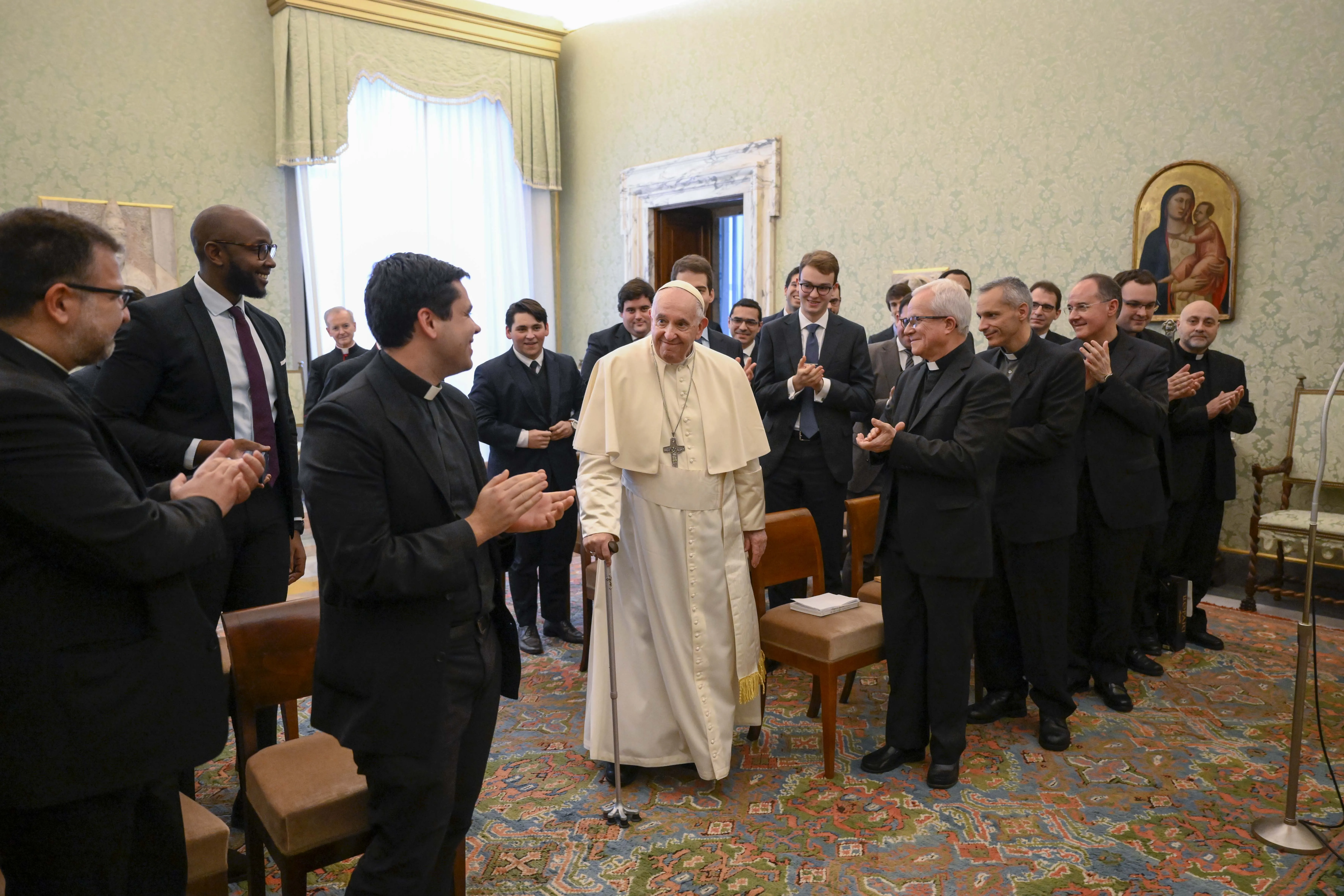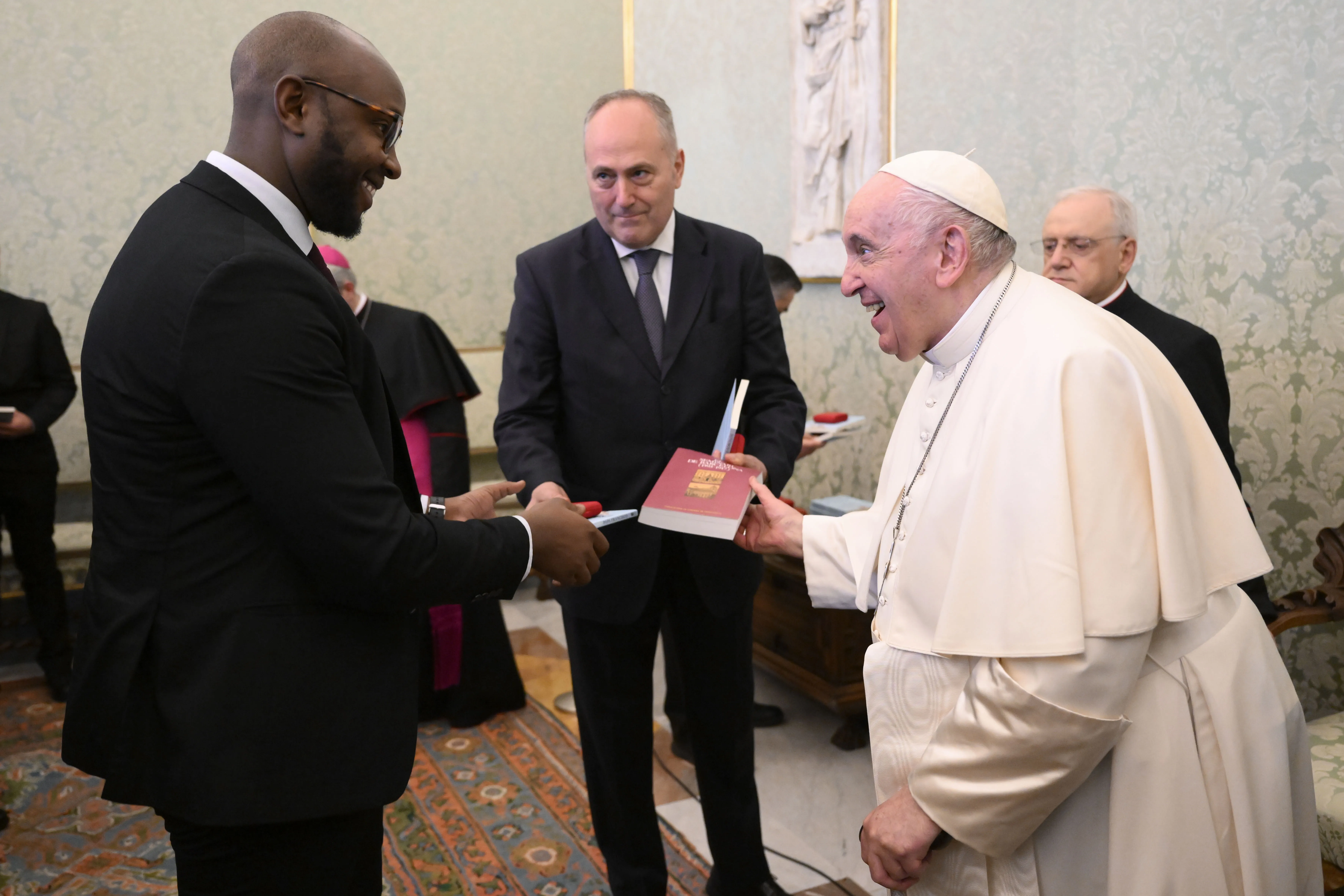
Vatican City, Feb 21, 2022 / 04:49 am (CNA).
Pope Francis has issued a decree confirming that the Priestly Fraternity of St. Peter (FSSP) can continue to use the liturgical books in force in 1962, according to the traditionalist group.
In a communique published Feb. 21, the FSSP said that Pope Francis met with two members of the priestly fraternity for nearly an hour, a week before he promulgated the decree.
“In the course of the audience, the pope made it clear that institutes such as the Fraternity of St. Peter are not affected by the general provisions of the motu proprio Traditionis custodes, since the use of the ancient liturgical books was at the origin of their existence and is provided for in their constitutions,” it said.
The FSSP is a canonically approved community of priests dedicated to the “formation and sanctification of priests in the cadre of the traditional liturgy” and the care of souls and pastoral activities in the service of the Church.
The group has more than 50 personal parishes in North America and is active in 39 dioceses across the United States. It also has 85 apostolates in France and Belgium and 79 apostolates in Germany, Austria, and Switzerland.
The decree gives the FSSP full permission to offer the Traditional Latin Mass, carry out the sacraments, and fulfill the Divine Office, according to the Missal, the Ritual, the Pontifical and the Roman Breviary that were used in 1962.
This faculty is limited to the FSSP’s own churches and oratories, unless there is consent from the local Ordinary, with the exception of private Masses.
The FSSP said that Pope Francis signed the decree, issued in Spanish and Latin, on Feb. 11, the feast of Our Lady of Lourdes and the date that the group was solemnly consecrated to the Immaculate Heart of Mary.
The Holy See press office had not responded at the time of publication to a request from CNA to confirm the text of the decree.
According to the group, the pope received Father Benoît Paul-Joseph, the superior of the FSSP district of France, and Father Vincent Ribeton, the rector of St. Peter’s Seminary in Wigratzbad, Germany, in private audience on Feb. 4.
“During the very cordial meeting, they recalled the origins of the fraternity in 1988, the pope expressed that he was very impressed by the approach taken by its founders, their desire to remain faithful to the Roman Pontiff and their trust in the Church. He said that this gesture should be ‘preserved, protected and encouraged,’” the FSSP said.
The meeting took place more than six months after Pope Francis issued Traditionis custodes (“Guardians of the tradition”), a motu proprio that restricted the use of the Traditional Latin Mass and prohibited it from being celebrated in parish churches without the permission of the local bishop.
The priestly fraternity said in July 2021 that it was surprised and deeply saddened by the reasons given for limiting the use of the Missal of Pope St. John XXIII.
The group noted that the Traditional Latin Mass had prompted “many people” to discover the Catholic faith or return to the Catholic faith.
“How can we fail to notice, moreover, that the communities of the faithful attached to it are often young and flourishing, and that many Christian households, priests or religious vocations have come from it,” it said.
FSSP was founded by 12 priests who were formerly members of the Society of St. Pius X (SSPX), a group that has a canonically irregular status.
The FSSP’s constitutions reference the teachings of the Second Vatican Council, and the fraternity says that it “has always sought to be in accord with what Pope Emeritus Benedict XVI called in 2005: ‘the hermeneutic of reform in the continuity of the Church.’”
“Grateful to the Holy Father, the members of the Fraternity of St. Peter are in thanksgiving for this confirmation of their mission,” the FSSP said on Feb. 21.
“They invite all the faithful who feel close to them as a spiritual family to attend or join them in prayer at the Mass tomorrow, on the feast of the Chair of St. Peter, and to pray for the Supreme Pontiff.”
If you value the news and views Catholic World Report provides, please consider donating to support our efforts. Your contribution will help us continue to make CWR available to all readers worldwide for free, without a subscription. Thank you for your generosity!
Click here for more information on donating to CWR. Click here to sign up for our newsletter.









You know what ? All the popes since Vatican II who did not like something they could not simply stop have taken the path of confirming it in the form of an authorization. Think of Paul VI and the taking of communion in the hand : he attempted to regulate a practice that was already widespread. With this in mind, when you think that the prefect of the congregation for liturgy stated in December that the use of the roman pontifical for ordinations is prohibited, and that the FSSP is supposed to be wilfully submitted to the Vatican, but that a Novus Ordo bishop has ordained five subdeacons on February 12, the day after the decree was promulgated (but obviously this had to be planned well in advance), one must conclude that Francis prefers to look like he changed his mind, rather than looking like he lost all authority.
To be more precise : five subdeacons were ordained on February 12 in Denton, Nebraska, at the FSSP seminary of Our Lday of Guadalupe… and obviously in the old rite, since there are no subdeacons under the new rite.
Was it thoughtlessness or deliberate cruelty that prevented the original document from making this clarification?
Hmmmmm.
1) The Vatican has not yet officially released the Decree. WHY NOT?
2) A few days after the Responsa came out in Dec. 2021, Ed Pentin at NC Register interviewed Archbishop Roche. Pentin specifically asked whether TC and Responsa applied to ex-Ecclesia-Dei communities. Roche DID NOT ANSWER THE QUESTION! Instead, replied thus: “The Congregation for Consecrated Life and Societies of Apostolic Life has competency over the particular Institutes you mention.”
Fr. Z. today suggests the CCLSAL may have another shoe to drop.
In my FSSP parish, throughout the last eight months, priestly countenances have displayed discernible angst. But note: No mention had ever made of ecclesial-political chess board moves. Everything had been prudently nuanced and subtle. Blink and you’d miss it. UNTIL LAST WEEKEND. Then our pastor delivered a homily on the inherent Unity of all members in the Body of Christ, the Church. Laity were encouraged to participate in the Fraternity’s Novena from 2 Feb. (Candlemas) until 12 Feb. (Our Lady of Lourdes, on which day the Society and laity made consecration to Our Lady). Tomorrow, the Feast of St. Peter, a wonderful liturgy is planned, indulgences granted. Joy is unavoidable. The child has been allowed to take his first step.
Will somebody qualified and who has wrestled with this explain to me how the very notion of a “private Mass” can be justified in the face of the very clear definition of the liturgy as the public worship of the Church. Surely an exemption for a “private Mass” would be apt for a priest confined in a hospice and who likely may die in a few weeks. But to make “private Mass” by de jure edict a routine daily or weekly de facto standard anywhere in any canonical Catholic setting seems a contradiction, almost as if we are saying here’s a Mass that is more like a private sacramental devotional practice than a fully licit sacrament.
I’m not qualified and I’ve not wrestled, but I have a couple minutes. The Baltimore Catechism (BC) – primarily in disuse – defines a “private Mass” as the TLM Low Mass because it was said in a low voice; other Masses (High, Solemn, Pontifical) were sung, with assistants/attendants. The BC is online; the sections on the Mass begin about paragraph 920ff. It is very interesting; e.g.,
“Q.921…
A. The Mass is the same sacrifice as that of the Cross because the offering and the priest are the same — Christ our Blessed Lord; and the ends for which the sacrifice of the Mass is offered are the same as those of the sacrifice of the Cross.
Q. 922. What were the ends for which the sacrifice of the Cross was offered?
A. The ends for which the sacrifice of the Cross was offered were:
To honor and glorify God;
To thank Him for all the graces bestowed on the whole world;
To satisfy God’s justice for the sins of men;
To obtain all graces and blessings.
Q. 923. How are the fruits of the Mass distributed?
A. The fruits of the Mass are distributed thus:
The first benefit is bestowed on the priest who says the Mass;
The second on the person for whom the Mass is said, or for the intention for which it is said;
The third on those who are present at the Mass, and particularly on those who serve it, and
The fourth on all the faithful who are in communion with the Church.
Q. 924. Are all Masses of equal value in themselves or do they differ in worth?
A. All Masses are equal in value in themselves and do not differ in worth, but only in the solemnity with which they are celebrated or in the end for which they are offered.
…
A. Mass may be offered for any end or intention that tends to the honor and glory of God, to the good of the Church or the welfare of man;…”
Canon law does not require a priest to say Mass every day, but priestly custom/tradition suggests that he do. [It may have been required in the past…] When a priest is on vacation, e.g., camping, he would say a private Mass in his tent or in the outdoors. Prisoners of war or concentration camp inmates said private Masses… A ‘private’ Mass does not exclude other persons from participation. Nor would/should the priest deny other persons’ participation; that would go against the reason, purpose, and essential goodness of Christ’s salvific action on the Cross as represented in the Mass. Priests who’ve not had their faculties suspended but who are not allowed to practice active ministry (ie., those sentenced to a life of prayer and penance) may say private Mass but I’m not sure if regular laity may participate…
Hope this gives you some ideas for further research.
The decree exempts private Masses from permission, if I understand correctly. Is that your understanding?